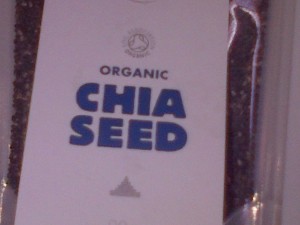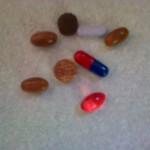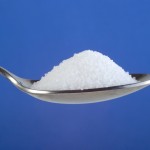As many of you will know I’m rather partial to what are called superfoods. While, it seems, there is no formal definition of Superfood the terms is, typically, used to describe foodstuffs which have a high nutrient value. Therefore offering greater health benefits than the run of the mill stuff we often eat.
In fact superfoods are still a bone of contention in our house. My wife claims I secretly grated broccoli, which she hates, on her food while she was pregnant with our first child.
For more background on superfoods please have a look at https://patienttalk.org/?p=276 . It includes links to pro and anti superfoods discussions.
But to return to the point of the blog. Last week my wife returned home brandishing a copy of a magazine which gave a recipe for a dish which included something called chia seeds. Which, according to the article, were superfoods? “What on earth are Chia seeds?” I exclaimed. To which I received the traditional “search me” look.
So I decided it was my duty, as a healthcare blogger, to find out more about the health benefits of chia seeds. Indeed in America the chia craze has been going for a few years but it seems that Europe is about to catch up.
Chia is a member of the mint family which grows in Latin America. Apparently it was a staple of Aztec and Mayan cooking. However it is the seeds themselves which are of particular interest. Chia seeds contain:-
a) More Omega 3 fatty acids than salmon.
b) A great source of antioxidants. You can read up on antioxidants here https://patienttalk.org/?p=252
c) Very high in dietary fibre
d) A source of calcium and iron and a number of B vitamins
e) May lower cholesterol and help prevent heart disease
Chai seeds are often used by athletes and a table spoon of the seeds has been described as the equivalent of a smoothie of salmon and spinach.
So how do you take it? Well it is a common addition to smoothies and health drinks. Have a look at https://patienttalk.org/?p=638 for more info.
The downside of chai seeds is the cost. But if they take off we can only hope it will come down.
In fact today is going to be the first time I’ve tried chai seeds. I’ll be using this recipe for BLACK BEAN SOUP WITH SUPER CHIA GARNISH for Stylist Magazine which can be found here http://www.stylist.co.uk/life/recipes/black-bean-soup-with-super-chia-garnish. Once we have tried it I’ll give you an update. Given that I love black beans I’m sure I’ll be a fan.
If you have used chia seeds it would be great if you can tell us how you found them using the comments box. If you have any recipes then please share them as well
Many thanks in advance.




